Today's Tidbit... Having Your Prayers Answered, And Other Regrets
I lived in Missouri in 1990 when Colorado benefited from a fifth down play to win at Missouri. Unfortunately, the Buffaloes inappropriately benefited from the call to win the game. Despite a Week 1 tie with Tennessee, a Week 3 loss to Illinois, and a fifth-down win, some buffoons awarded the Buffaloes a shared national championship.
Something similar, but more honorable, occurred in 1940 when Cornell, who had not lost in their last 18 games, traveled to Hanover, New Hampshire, to meet a 3-4 Dartmouth team.
Cornell met their match that game. The Indians played Cornell tough for most of the game, with Dartmouth kicking a field goal early in the fourth quarter to take a 3-0 lead. Then, with three minutes left on the clock, Cornell began a drive that brought them to Dartmouth's 6-yard line on right halfback Bill Murphy's catch on a crossing route with one minute to play.
What happened next was open to some argument since college football did not yet have official scorers.* Nonetheless, most sportswriters' records showed Cornell gaining three yards on first down, taking the ball to the two. Cornell ran the ball once more and was stopped for no gain. Cornell illegally sent in a substitute to stop the clock, and the 5-yard penalty gave them fourth down from the six. On fourth down, Cornell rolled right, throwing a pass toward the end zone that Dartmouth batted down.
That should have ended Cornell's possession, but the referee became confused and gave Cornell a fifth down. While readying himself for the fifth down play, Cornell's Bill Murphy said a prayer:
Dear Lord, if you let me score a touchdown on this play, I promise to attend mass every day for a year!
In some respects, the gods looked favorably on Murphy and Cornell that afternoon when Cornell ran the same play they had run on fourth down. This time, Murphy caught a pass in the end zone, giving Cornell a 7-3 victory. But the story did not end there.
While Dartmouth protested the play on the field, the referee ruled as he had ruled, so Dartmouth left the field in defeat while the Big Red spent the evening celebrating their 19th game without a loss.
The next day, both schools absorbed the reports of those involved and indicated their willingness to accept the after-the-fact ruling of the referee and the East Coast Athletic Conference. However, although the referee later admitted his error, he indicated that his authority ended when he blew the final whistle. The ECAC said much the same—the two schools would have to make the decision themselves.
Thankfully, Cornell football filmed their games in 1940, and a review of the sequence by the coaches and school president forced them to conclude that Cornell had scored on fifth down.
On the Monday following the game, Cornell conceded the game to Dartmouth so that the final score stood at 3-0 in Dartmouth's favor forever more. Those in and outside the football world praised Cornell for taking a right and noble path, and that ended the story for almost everyone.
However, the decision left Bill Murphy with doubts. Having prayed for the win and committed to attending mass every day for a year if Cornell won, he needed a ruling on whether to follow his promise to God based on the call on the field or the pronouncement of his earthly college president.
Seeking guidance, Murphy turned to the Cornell chaplain, who absolved Murphy of his duty to attend daily mass, though he did not discourage regular attendance. How often Murphy attended mass the following year went unreported. Neither do we know whether Murphy believed God answered his prayer. So, it is up to you, the reader, to sit in judgment on this issue.
*As described in this story, teams submitted their stats to the American Football Statistical Bureau, a private organization the NCAA acquired in 1959. The NCAA recognizes their stats from 1937 on as the official NCAA statistics.
Football Archaeology is reader-supported. Click here to buy one of my books or otherwise support the site.



